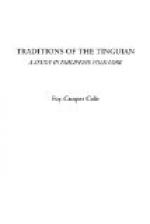The power of assuming animal forms appears to be a common possession, and we find the different characters changing themselves into fire-flies, ants, centipedes, omen birds, and in one case into oil [40] (pp. 85, 99).
One of the most peculiar yet constantly used powers of these people is their ability to send betel-nuts on various missions. Whenever an invitation to a ceremony or celebration is to be extended, nuts covered with gold are oiled and sent out. They go to the intended guest, state their errand, and, if refused, forthwith proceed to grow on his knee, forehead, or pet pig, until pain or pity compels him to accept (p. 146). In some cases it appears that the nuts themselves possess the magic properties, for we find Aponitolau demanding that his conquered foes give him their betel-nuts with magic power (p. 91).
Relationships can be readily ascertained by the chewing of these nuts, for when the quids are laid down they are transformed into agate and golden beads and lie in such a manner that the associations are fully established (pp. 35, 36, 41).
Enough has been mentioned to show how important a part magic and magical practices play in the life of this people, but one further reference should be made, since it is found in nearly every tale. When the marriage price is settled upon, the mother of the groom exercises her power and at once fills the spirit house with valuable jars and the like; this is repeated until enough are gathered to meet the demands of the girl’s people (p. 133). Even when the agreed sum has been delivered we often find the girl’s mother herself practicing magic, to secure additional payment, and by raising her elbows or eyebrows causing a part of the jars to vanish (pp. 133, 143).
Despite their great gifts we find that these people are not all-powerful and that they deem it wise to consult the omens before starting on a task or a journey. The gall sack and liver of a pig are eagerly examined, [41] while the calls of birds, actions of animals, or signs received from the thunder and lightning regulate their conduct. In cases where these warnings are disregarded misfortune or death always overtakes the individual (pp. 48, 49, 100 ff).
Death comes to them, but apparently is only a temporary state. The deceased are often revived by some magical process (p. 152), but if not the corpse is placed on a raft and is set adrift on the river. [42] The streams and rivers, we are told, all flow past Nagbotobotan before they empty into the hole where all streams go. In this place lives the old woman Alokotan, who is related to the people of Kadalayapan and Kaodanan. Her duty it is to watch for dead relatives, to secure them, and make them alive again (p. 132). She is the owner of a magic pool, the waters of which revive the dead and renew youth.




